Ministry of Jal Shakti
DDWS Organises One-day Workshop on “Communication and PRA Tools for Jan Bhagidari” under Jal Jeevan Mission
Union Minister of Jal Shakti Shri C.R. Patil Addresses the Workshop and Launches Several Key Initiatives
Active Participation from RWPF Partners and States in Co-Creating Participatory Tools for Sustainability of Rural Water Supply Schemes
Posted On:
12 NOV 2025 4:10PM by PIB Delhi
The Department of Drinking Water and Sanitation (DDWS), Ministry of Jal Shakti, organised a one-day workshop of the Rural WASH Partners’ Forum (RWPF) on “Communication and PRA Tools to Promote Community Engagement (Jan Bhagidari)” on 12th November 2025 at SCOPE Complex, New Delhi.
The event witnessed the presence of Union Minister of Jal Shakti, Shri C.R. Patil; Secretary, DDWS, Shri Ashok K.K. Meena; Additional Secretary & Mission Director, National Jal Jeevan Mission (NJJM), Shri Kamal Kishore Soan; Joint Secretary – NJJM, Smt. Swati Meena Naik; Joint Secretary and Mission Director – Swachh Bharat Mission (Grameen), Smt. Aishvarya Singh; along with senior officers from DDWS, Ministry of Agriculture and Farmers Welfare (MoAFW), Department of Water Resources, National Water Mission, Ministry of Panchayati Raj, Central Ground Water Board (CWGB), India Meteorological Department (IMD), National Water Informatics Centre (NWIC), Bhaskaracharya National Institute for Space Applications and Geo-informatics (BISAG-N) and National Remote Sensing Centre (NRSC). Representatives from the States and UTs, RWPF members, and development partners were present in the event.
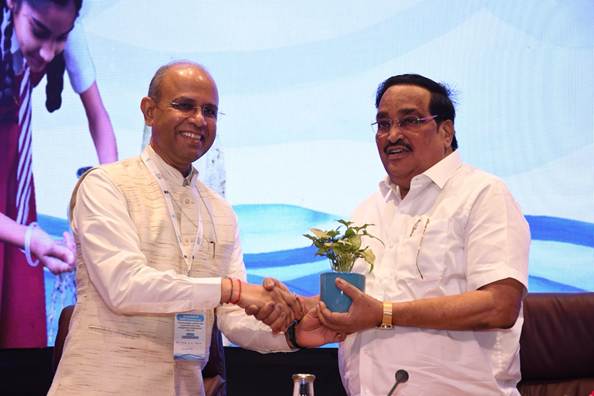
The workshop began with the unveiling of key initiatives by Union Minister of Jal Shakti, Shri C. R. Patil, in the presence of senior officials from DDWS. These included:
- Decision Support System (DSS) for Source Sustainability
- JJM Panchayat Dashboard
- First episode of Community Radio Programme – “Swachh Sujal Gaon Ki Kahani: Radio Ki Zubani”
- Handbook on Community-Managed Piped Water Systems in Rural India – “Jan Bhagidari se Har Ghar Jal”
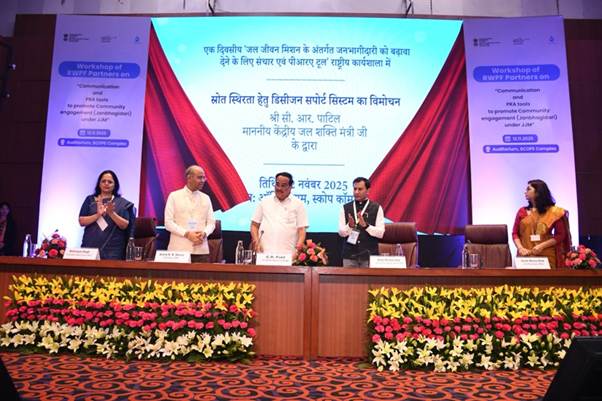
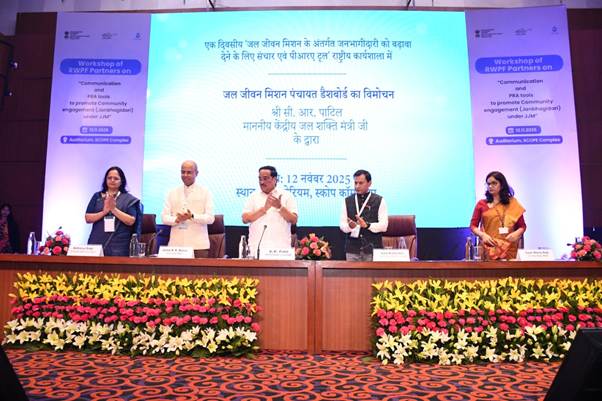
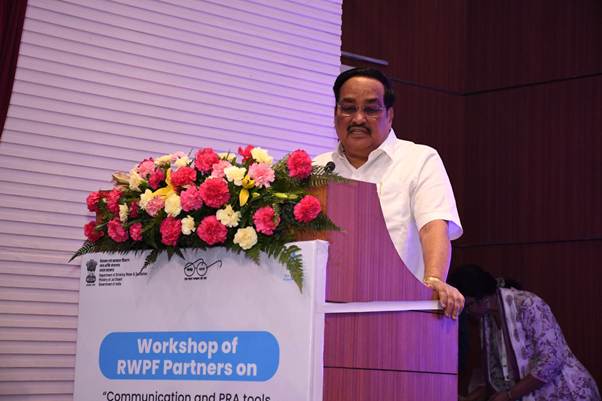
Addressing the gathering, the Union Minister said that the Swachh Bharat Mission (Grameen) and Jal Jeevan Mission are living embodiments of the Hon’ble Prime Minister’s vision that “Jan Bhagidari se hi Jan Kalyan sambhav hai.” He highlighted that over 9 crore women have been freed from the drudgery of fetching water, and as per WHO estimates, rural India can save 5.5 crore person-hours every day, enhancing productivity and women’s participation in the workforce. He noted that the “Jal Sanchay Jan Bhagidari” initiative launched by the Prime Minister focuses on groundwater recharge, rainwater harvesting, and borewell rejuvenation to ensure long-term water sustainability. The Minister underlined ongoing efforts to empower Gram Panchayats through digital innovation and transparency, making them self-reliant in managing water resources.
In his inaugural address, Shri Ashok K.K. Meena, Secretary, DDWS, emphasised that Jan Bhagidari is the very philosophy of the Mission. He said that JJM was designed as a bottom-up programme built on community ownership, local decision-making, and sustainability. “People are not beneficiaries; they are guardians of their water systems,” he said.
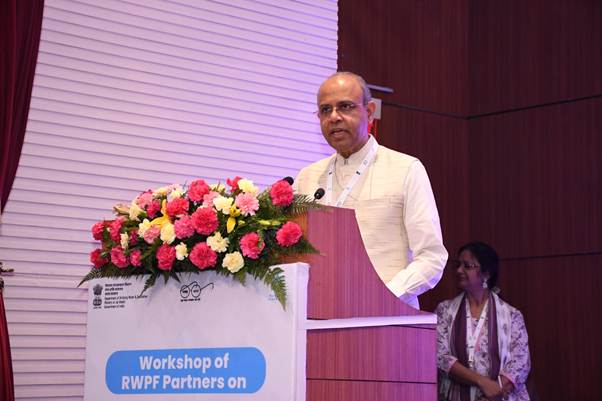
Highlighting the importance of communication and behavioural change, the Secretary said that the workshop aims to design tools that translate participation into tangible action. He further said that technology and transparency have become the twin pillars of progress under JJM.
Strengthening Source Sustainability through DSS
The Decision Support System (DSS) has been developed as a comprehensive digital planning tool integrating multiple datasets to guide data-driven decision-making for source sustainability. The DSS has been currently operational in 234 districts, with the remaining districts to be onboarded within the current financial year.
The system integrates layers such as rainfall (CGWB – Decadal Mean), water level (CGWB – Decadal Mean), slope (Digital Elevation Model – BISAG-N), drainage and aquifers (NWIC), recharge potential areas (CGWB), land use and land cover (NRSC–NWIC), and water quality (CGWB).
In its next phase, DSS will include additional layers such as Springshed data, criticality assessment of water sources, artificial recharge structures, and district-level rainfall data from IMD and Agriculture Departments.
The revised MGNREGA guidelines issued recently, mandating dedicated expenditure on water-related works such as groundwater recharge, rainwater harvesting, and source protection, will complement this system, ensuring long-term source sustainability, This convergence will enable district authorities to plan more effectively for water resource management.
Empowering Panchayats through an Interactive Dashboard
The newly launched JJM Panchayat Dashboard is a major step toward strengthening data transparency, local ownership, and decentralized monitoring. It will be accessible through the e-Gram Swaraj Portal, providing real-time access to data and visualisation for Gram Panchayats.
The dashboard is interactive and empowering – it will not only enable viewing of data on both the State Water and Sanitation Mission (SWSM) and District Water and Sanitation Mission (DWSM) dashboards, but also allows inputs on water supply status directly by Panchayats, ensuring timely action.
To date, 67,273 Sarpanch and Panchayat Secretaries have logged in through the e-Gram Swaraj portal. With the upgraded dashboard, Panchayats will now be able to:
- Provide real-time information on functionality aspects including water supply status, quality monitoring, and community participation.
- View pipelines and assets tagged under PM Gati Shakti.
- Update details regarding Water Supply Operators.
- Access IEC material, water quality data, and details of women trained in FTK testing.
Connecting Communities through Radio: “Swachh Sujal Gaon Ki Kahani”
The Community Radio Programme “Swachh Sujal Gaon Ki Kahani: Radio Ki Zubani” has been launched to connect with rural audiences across India through engaging storytelling and dialogue.
The programme will be aired through 100 radio stations across the country in collaboration with Community Radio Association (CRA), in 13 national and 34 local dialects. It features two lively characters – Sujal Kumar and Swachhika Kumari, who take listeners on an inspiring WASH journey across rural India, sharing real stories of transformation. To make the programme more interactive, it will include quiz competitions and community segments encouraging participation, awareness, and ownership among listeners.
Handbook on Community-Managed Piped Water Systems
The Handbook “Jan Bhagidari se Har Ghar Jal” is the first-of-its-kind comprehensive guide for Gram Panchayats, VWSCs, SHGs, and community leaders on the commissioning and handing-over protocols for rural water supply schemes.
It also includes District Technical Unit (DTU) – a specialized technical institution designed to bridge the gap between policy and ground-level implementation. DTUs will ensure that substantial public investments translate into sustainable water supply services.
While VWSCs are primarily responsible for the operation and maintenance of their village water systems, the handbook outlines a clear mechanism, wherein issues that cannot be resolved at the village level may be raised to the DTU through the Gram Panchayat Dashboard, ensuring timely technical and administrative support. The review of the functioning of DTUs will be taken during the DWSM meetings by the District Collectors.
The Handbook also highlights the importance of community-led ceremonies and traditions that mark the transfer of ownership and responsibility of water supply systems to the people. To reinforce local pride and participation, it encourages villages to organize events such as “Jal Arpan”, “Jal Bandhan”, and “Jal Utsav” – symbolic occasions celebrating water as a shared responsibility and collective achievement.
These occasions turn the transfer of ownership into a festival of trust — where women, children, and elders together pledge to keep their village water system flowing for generations to come.
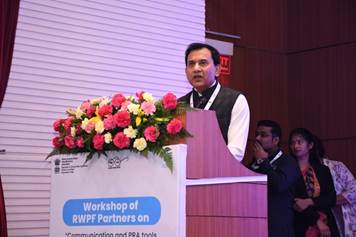
Earlier, Shri Kamal Kishore Soan, Additional Secretary and Mission Director, NJJM, had set the context of the workshop, highlighting the importance of participatory communication and practical field tools for community engagement. “Systems endure only when people make them their own. Jan Bhagidari is a way of working – from infrastructure to involvement, from delivery to dialogue,” he said.
Smt. Swati Meena Naik, Joint Secretary - NJJM outlined the objectives of the workshop and guided eight thematic breakaway sessions where RWPF partners, State IEC teams and thematic officers co-created Participatory Rural Appraisal (PRA) tools on:
- Functionality assessment and service delivery;
- Source sustainability and protection;
- Commissioning and handing-over protocols;
- Preventive maintenance and grievance redressal;
- VWSC enterprise models;
- Safe water awareness and trust-building;
- Greywater management; and
- Promoting Jan Bhagidari through local celebrations like Lok Jal Utsav.
In the concluding plenary, RWPF partners presented outcomes from their sessions. Summarising the deliberations, Smt. Swati Meena Naik said that the PRA tools discussed in the workshop are the steps initiated to move towards decentralisation of the program implementation and involving communities and local governance for bringing in efficiency and sustainability in piped water supply operations. The handbook provides a framework for Jan Bhagidari detailing the organisation of Jal Arpan diwas, celebrating the day of ownership and Jal Utsav for making piped water supply operations and management a part of their lives.
Concluding the workshop, Shri Kamal Kishore Soan urged participants to carry forward the collective spirit of Jan Bhagidari. “Jal Jeevan Mission is a people’s movement built on trust, participation, and purpose. These tools are for our people. They will help Gram Panchayats and VWSCs manage water with wisdom, protect sources with foresight, and sustain systems with pride,” he said.
He encouraged States, UTs, and partners to translate the new launches, the Handbook, DSS, Panchayat Dashboard and Community Radio Series, into tangible field-level outcomes.
The event concluded with a vote of thanks by Shri Umesh Bhardwaj, Deputy Secretary, DDWS, reaffirming the Department’s commitment to Jan Bhagidari se Har Ghar Jal – ensuring that every drop delivered to every home is sustained through community participation and shared responsibility.
***
ND
(Release ID: 2189196)
Visitor Counter : 1758